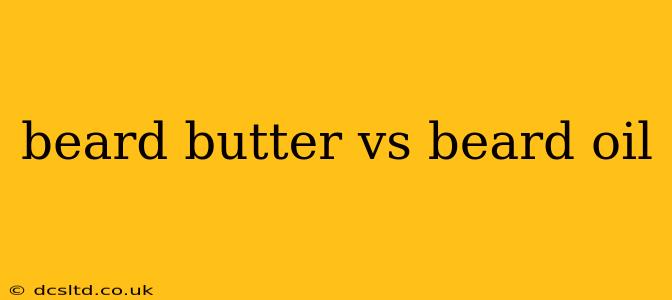Choosing between beard butter and beard oil can feel like navigating a dense forest of grooming products. Both aim to soften, condition, and tame your beard, but they achieve this through different mechanisms and suit different beard types and climates. This comprehensive guide will help you understand the key differences between beard butter and beard oil, empowering you to make the best choice for your facial fuzz.
What is Beard Oil?
Beard oil is a lightweight, fast-absorbing product typically composed of carrier oils (like jojoba, argan, or grapeseed oil) and essential oils for fragrance and added benefits. Its primary function is to moisturize the skin underneath the beard and condition the beard hairs themselves, preventing dryness, itchiness, and breakage. It's excellent for adding shine and making the beard more manageable.
What is Beard Butter?
Beard butter is a thicker, richer product that combines oils with butters (like shea butter, cocoa butter, or mango butter). This combination provides deeper conditioning and moisture than oil alone. Beard butter creates a protective barrier, offering more significant protection against the elements, particularly in colder, drier climates. It also helps to soften and define the beard, leaving it feeling fuller and healthier.
Beard Butter vs. Beard Oil: Key Differences Summarized
| Feature | Beard Oil | Beard Butter |
|---|---|---|
| Consistency | Liquid, lightweight | Thick, creamy |
| Absorption | Fast | Slower, leaves a residue |
| Moisture | Moderate | High |
| Protection | Moderate | High |
| Shine | High | Moderate |
| Best for | Shorter beards, warmer climates | Longer beards, colder climates |
Which is better for a short beard?
For shorter beards, beard oil is generally preferred. Its lighter consistency allows for easier absorption and prevents a greasy feeling, which can be more noticeable with shorter facial hair. The added shine from the oil also enhances the appearance of a short beard.
Which is better for a long beard?
Longer beards benefit significantly from the deep conditioning and protective properties of beard butter. The thicker consistency helps to manage longer, more unruly hairs, providing moisture and reducing the risk of dryness and breakage. The added protection offered by the butter is also valuable in shielding against harsh weather conditions.
Does beard butter leave your beard greasy?
Beard butter can leave a slightly greasy residue, especially if you use too much or your beard is already quite oily. However, this is usually less noticeable than with certain beard balms, and many men appreciate the added conditioning and hold this residue provides. It’s all about finding the right balance and using the appropriate amount for your beard type.
Can you use beard oil and beard butter together?
Yes! Many men find that combining beard oil and beard butter provides the best of both worlds. Using oil first will provide a base layer of moisture, followed by the butter for added conditioning, protection, and hold. This is particularly effective in dry climates or for those with longer, coarser beards.
How often should you use beard butter?
The frequency of beard butter application depends on your beard type and the climate. Those with drier beards or living in arid climates may need to apply it daily, while others may only need it every other day or even less frequently. Start with daily application and adjust as needed based on your beard's condition.
Conclusion
The choice between beard butter and beard oil depends largely on individual preferences, beard length, and climate. Beard oil offers lighter conditioning and shine, best suited for shorter beards and warmer environments. Beard butter provides deeper conditioning, protection, and hold, ideal for longer beards and colder climates. Experimentation is key to finding the perfect product (or combination of products) that works best for you. Remember to always choose high-quality products containing natural ingredients to ensure the health and well-being of your beard and skin.
